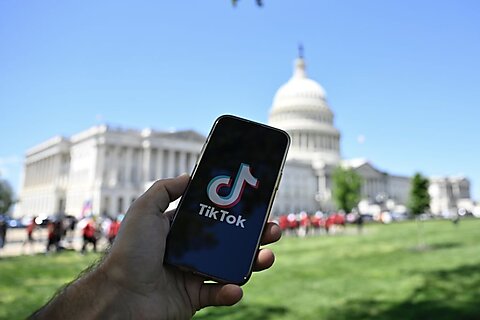Jennifer Huddleston
Last week, some headlines stated that the US had passed a “TikTok ban” as part of the foreign aid package, likely eliciting panic from many of the millions of American individuals and businesses who use the popular social media app. But the actual proposal is more nuanced, and the exact questions of what will happen are likely to take months—if not years—to settle. So, what should Americans expect now that the proposal is law?
In the next few months users are unlikely to notice changes.
Calling the proposal that was signed into law a “TikTok ban” is a bit of a misnomer although that could end up being a result. The actual proposal that was included in the foreign aid package requires certain apps designated by the US government as being controlled by a foreign adversary to divest in a way approved by the US government as removing that influence within a certain time frame. If they fail to do so in the time frame, the proposal prohibits the distribution, updating, or maintenance of such apps.
While the proposal could apply to other companies as discussed below, it explicitly names TikTok and parent company ByteDance as a company to which its terms apply. In short, the signing of the bill started a clock that forces TikTok to engage in a sale or face a ban. This means that the company would have roughly nine months (a rather short time frame) to find a buyer for some portion of the app that satisfies the government’s concerns or face a ban.
It remains unclear exactly what elements of the social media app would need to be sold to respond to these concerns or what, if any, buyer the government would consider as alleviating these challenges without facing additional regulatory scrutiny.
To be clear, as I have discussed in other work, there are many concerns about the impact this proposal will have on TikTok’s American users and their speech rights. Still, for the next few months, the legal status of the app does not really change, and most users are unlikely to experience changes related to the law. In general, users should still be able to update and use the app and see it available on app stores as they did before the law’s passage.
Litigation is almost certain.
TikTok has already said it will challenge the law in court; however, no case has yet been filed. This challenge is likely to raise several concerns, including First Amendment questions, takings‐related issues, and possibly bill of attainder.
Particularly should a sale fail in the time frame, TikTok users or creators could challenge the law for the impact it would have on their speech and their business. I have explored the legal issues particularly related to the First Amendment rights of these users in previous work.
While a divest or ban proposal is distinct from prior attempts at a ban, precedents around bans indicate that the courts will likely be skeptical of such a significant action when less speech‐restrictive means like disclosure, data audits, or data localization could respond to national security concerns. Past examples of legal challenges to TikTok bans, including the executive order during the Trump administration and the Montana state‐level ban of 2023, have resulted in these bans being struck down or enjoined.
So, what will the court have to consider in its analysis of likely constitutional questions in a challenge to a ban? Much of the discourse focuses on the First Amendment‐related, free expression concerns. This means courts will consider if the proposal merits intermediate or strict scrutiny and whether the government has made a sufficient argument on its national security grounds compared to the impact on speech.[1] Additionally, the courts will also likely consider if the proposal is content‐neutral or a content‐based restriction and/or whether it constitutes a prior restraint.
The litigation could mean it is an even longer time before the implementation of any divest‐or‐ban timeline. The parties will likely request a preliminary injunction during litigation, which could at least pause any impending bans. A preliminary injunction would be likely if, for example, the court found there was a high likelihood of harm to speech while the case was pending.
Bigger than TikTok.
While this proposal names TikTok and has some limiting principles, it could be applied to other apps as well. As many have noted, popular e‑commerce services like Shein and Temu, which also have ties to China, could likely be covered as well.
But the proposal could extend much farther and be used to target specific companies an administration might disfavor. For example, Parler at one point relied on a Russian DDoS (distributed denial of service) guard service, and conservative video platform Rumble hosts Russian state media content. Could this be used by an administration to label those sites as controlled by a foreign adversary? As Senator Rand Paul (R‑KY) discussed in a Reason op‐ed, without clear limits, this could allow the government to force sales or changes from many more companies than one might initially think with little due process to respond to such a classification.
Conclusion
The average TikTok user may not experience changes immediately as a result of the signing of the often mischaracterized “TikTok ban,” but the actual impact of the law is more significant than TikTok. Whether one is a TikTok user or not, this new law could open the door to significant executive intervention in the technology market and it raises First Amendment concerns that merit attention.
[1] A federal court issued a preliminary injunction to the Montana TikTok ban stating it was likely to fail even intermediate scrutiny but did not reach a conclusion on the appropriate level of scrutiny.

